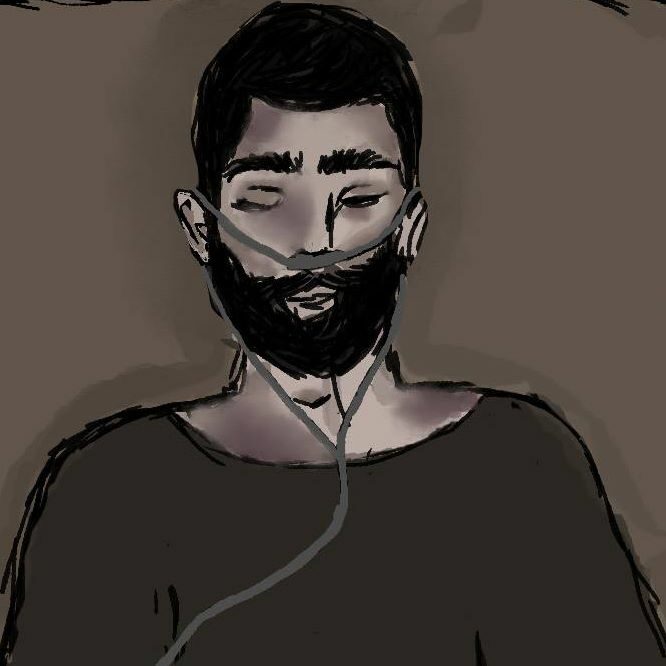Video by Shahed Ali
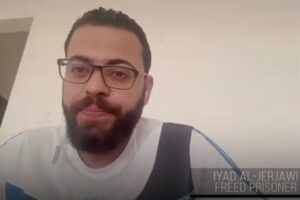
IYAD AL-JERJAWI
Former prisoner
“I got arrested on the 13th of June, 2011. I was on a medical trip from Gaza to the Palestinian hospitals in the occupied territories. I was transferred to Al-Makassed hospital. On my way back to the hospital, I got arrested.”
“I was taken to an interrogation centre called the Ashkelon Interrogation centre. The first humiliating experience you go through, is the frisking. Frisking with every sense of the word. He tries to humiliate you as a human. You are strip searched and all your belongings are taken away. The inspector tries to put you in a really tough mental state. Then you go through a tougher experience by staying in the prison cells. The prison cells are not fit, for any human being. The cell is a small place, with a low ceiling. The walls have a texture. Its colour is grey. Dim lighting. Bad smell. Large steel doors, which block any sound from the outside. Just a small opening in the wall, that allows for some air in the cell, without any circulation.”
“The time you spend during the interrogation, you never see the sun, and you can’t tell the day from the night. They try to make you lose control of time, to make you feel that you are in the unknown. The interrogation phase is very important. Firstly, you see Israel’s democracy. There are two types of interrogation, military interrogation, and a non-military one. What you go through is as follows, you are subjected to long hours of interrogation, shackled for long hours, up to 35 hours. The worst thing about interrogation is that it is based on psychological torture. We are talking about threats regarding your family members, and the length of your sentence. We are also talking about the use of intimidation. This is a very important factor for the prisoner, and especially when we’re talking about a sick one.”
“Whether you spent an hour, 2, 30, or 36, I have once spent 36hours straight. You only get untied for fifteen to minutes.”
“ During the interrogation phase, you only see the sun once. Here they show you the ‘good’ side of Israel, when the Red Cross visits you after 18 days. They walk you through a hallway. As you’re leaving you can feel the sun on your skin, because you are blindfolded during that phase.
“When you go to the prison after interrogation, you come under the custody of an agency called the prison service administration. Even the Israeli public opinion of this agency is low.”
“The difference between the prison’s clinic, Al-Ramleh prison’s clinic, and outside hospitals. The prison’s clinic doesn’t reach the standards of being a supermarket. Al-Ramleh prison’s clinic can only be described as human butchery.
Hospitals outside are from a different planet. Since my first day in prison, I was only given pain killers, which affected my kidneys. After a while they stopped it and refused to give me the medication I used to take. Since I had an operation done they intentionally required me to do new medical reports, and you need to go to a new doctor, etc…”
“ When I first started getting headaches, I tried different things to treat it. At times I would drink a lot of water, at others I would tie a band on my head, or it would reach the point that I would hit my head against the wall. We had no other option. If you go to the clinic, they’ll give you Acamol, or an injection of Voltaren. But it isn’t advised by doctors to take Voltaren, unless the pain is unbearable, because Voltaren is harmful for the kidneys and liver.”
“The pain spread from my head to my neck, my back, and my left shoulder. I woke up and my mouth was numb. I took no action at the time, because if I were to go to the doctor, he wouldn’t do anything to help. The next day, I woke up and I found, that the left side of my face doesn’t move. Everything on the right side was perfectly fine, yet the left… nothing. My fellow inmates notified the prison’s administration. The problem of taking me to the hospital has been ongoing for two years now.”
“It is not easy for a person to leave the prison to one of the hospitals outside the prison. Why is it difficult to go to these hospitals? Well because it will cost the IPS a lot of money, and it will uncover their crimes, such as medical negligence. This can become a bigger issue. They took me to the hospital. They ran a few tests on me. They found that I have a seventh nerve inflammation, the inflammation affected the nerves in the left lobe of the brain. The tissue was inflamed, it limited blood flow to the brain. They gave me some medication. One of the medicines they gave me was cortisone. Supposedly, according to the prescription and to the doctor, I’m supposed to take a certain dosage of it. The IPS gave it to me doubled. On the first day, I couldn’t smell with my left nostril, my sense of taste was gone, my hearing ability was decreased, pain in the left eye, and the head, and even the left side of my tongue was heavy when I was trying to talk. Once they gave me the double dose of cortisone, I stopped seeing, everything turned white. My body basically collapsed. It’ as if my body was split in two. The right side and the left side. The left side collapsed and is not functioning, the right side is functioning normally. We began trying to get the prison administration’s attention by creating noise, banging and hitting the door. They came and transferred me to the hospital. So I stayed in the hospital for my case. The next day I went back to prison, at around Asr time (mid afternoon). In the IPS van, which is the crudest thing you can experience, it’s basically made out of steel, you don’t see anything. We reached the prison, they told me they prescribed for you a new medication. The hospital informed the prison that I needed to go get an MRI scan, and I needed to take some medication, and in my case, should be seen by a neurologist. They kept postponing, until the 11th of September. On the 11th of September, I had a medical relapse, they transferred me to the hospital. They told them they would not admit me, until I got an MRI scan. So they took me back to prison. On the 11th of September, they made an appointment for me, and according to Israeli law, the approval to go out and get an MRI scan needs to happen within 3 months. What happened is the following; When you are transferred from one prison to another, it’s as if you are transferred from a different planet. All of the procedures have to begin from scratch. About a month before my scan, they transferred me from Hadarim Prison, to Jalbou’ Prison. The transfer means, well the message is clear, no mediation for you, we don’t want to help you. When they took me to Jalbou’ Prison, I initially refused to enter, I told them that this is my situation, and that I have an MRI scheduled, and taker me back to Hadarim Prison. So they gave me promises, that they will kick off the process again. From the 8th of November, the scan approval was in February of 2020. They took me to Poriya Hospital. During this whole period of time, I was in indescribable pain. Indescribable. On February 4th, they did a scan of the brain, neck and spinal cord. They refused to give me the report, or the diagnosis until February 14th or 15th.”
“ He never forgets that you he is the jailer, and that you are the prisoner. He wants to affect your mental and physical health.”
“I had an appointment in the hospital. I made a problem, bigger than you can imagine, and I refused to go back to the division. At this point, I was on the frontline of my battle with them. Organizations intervened, and pressure mounted on them.”
“The doctor, who is not necessarily a doctor, and the ‘mechanic’, or doctor told me that the situation is as follows, we sent your file to two professors in Rambam Hospital, and they are deciding to take a biopsy from you, and that if they take the biopsy, and if the results are bad there might be a possibility that your left side will become paralyzed, and your vision will be affected. They took me to Rambam Hospital, I sat with a professor. When you go to a hospital outside the prison, he doesn’t treat you like a prisoner, he treats you as a human. He told me that I have a tumor, between the first and second vertebrae, and everything in the brain is an infection as a result of the tumor. It is causing pressure on the nerves, that send signals to the senses. I asked whether it was malignant or benign, he told me that is not what matters. What matters is that you need to have an operation immediately. At the time I had 65 days left in prison. We went back to prison, with a new problem, and that is the operation. The IPS kept postponing from April, the hospital would send a date for the operation, and the IPS would cancel it, repeatedly. They started using the coronavirus, as their reasoning to cancel the operation.”
“In the early stages of coronavirus, they were treating us carelessly. The guards would go out and deal with the world, and they would come to prison, and refuse to wear masks. You could only imagine, prisons are overcrowded, and don’t have any ventilation, one case could infect the whole prison. We have a lot of sick people, and elderly prisoners. They stopped visits from lawyers, the Red Cross and all organizations, but they didn’t take any real preventative measures. The sanitizing spraying only happened after a great deal of pressure on them. Despite the virus and that countries all around the world were releasing prisoners, they were still bringing in more prisoners. They stopped putting the new prisoners under interrogation, they would put them in prison directly, which is unprecedented.”
“Back to our main topic, which is the operation, they kept postponing my operation. I requested early release. At the time I only had a few months left in my sentence. But they refused, citing that my health was okay. And when you go to a doctor he would say that I need an operation.”
“A healthy person that exercises regularly, will get worn out in prison due to the psychological pressure that he faces. I will keep mentioning the psychological aspect because it’s connected to the physical health. The amount of pressure you’re put under on a daily basis, from frisking, from raids, to suppression, to anxiety, to the sound of the shackles, to the lighting, to the monitoring. It’s as if you’re living George Orwell’s theory of ‘Big Brother.’These are all major psychological factors.”
“On the 14th of May, the hospital sent a notice, saying that you need to bring the patient, and that if the prison administration refuses, the hospital will send a complaint to the ministry of health. The hospital said that he needs to be here on the 20th of May, and prepared the operation room for me, and the lawyer was in touch with them. But the prison administration refused, and instead they gave me a court date on the 20th of May for an early release. They cancelled the operation again, so they don’t face judicial accountability, as they will be releasing me. I asked for release to the West Bank, because there are medical teams, in the Istishari Hospital in the West Bank. But for ‘security reasons’, the last court session was on the 8th of June. Which is three days before my release. The response was that I could get medical attention inside the 1948 occupied territories, at the time the IPS got me a new appointment with the hospital for the operation, on the 9th of July. A month after my release. You can tell me now that there are international laws, and international organizations overseeing such practices, and the 3rd and 4th Geneva Conventions.”
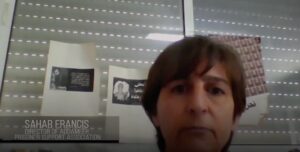
SAHAR FRANCIS
Director of Addameer Prisoner Support Association
“We can say that the medical negligence policy, is systematic, and it begins from the first moment of arrest, until the end of the sentence, and the release of the prisoner.”
“If a person is detained while wounded, injured or has been assaulted during the arrest, and he is undergoing an interrogation, usually, the medical condition of the detainee, such as a wound or injury, are used to put pressure on the prisoner, by telling him that medical treatment will be provided in exchange for a confession.”
“The living conditions inside Israeli prisons have an effect on the prisoner’s health. Isolation, lack of sun exposure, and proper ventilation.”
“Doctors inside interrogation centres are also complicit in this. In every interrogation centre there is a clinic where there are doctors and nurses. During the interrogation phase, doctors play a role in the torture process, because the doctor conducts daily check-ups to ensure that the prisoner can still tolerate more torture. And then submit a report to the intelligence in which they give them the green light to carry on the interrogation, as the prisoner’s health is good.”
“Unfortunately, these clinics are not equipped with all medical equipment, and even the medical staff are nurses and if there are doctors, there are usually general doctors and not specialists.”
“All the prisoners’complaints about pain are usually met with providing Paracetamol in its various types. This is also part of the procrastination process, through relieving the pain with painkillers and sedatives, without carrying out the necessary check-ups to determine what the disease actually is, and make a decision whether the prisoner should be transferred to a hospital or see a specialized doctor outside the prison service’s administration.”
“If you have certain symptoms that require tests, they take a long time until they do them. Even if the tests are done, sometimes they delay providing treatment, which deteriorates the prisoner’s health status. When the health conditions become serious, they might quickly transfer the prisoners to hospitals outside the Israeli Prison Services (IPS) administration.”
“ The problem is that the doctors who work for the prison service are not under the Israeli Ministry of Health, but they are employees for the prison administration and therefore, their loyalty is for the prison administration, not to the medical standards in accordance with regulations applied worldwide, in democratic countries.”
“Which is the most applicable to Palestinian prisoners, because most of the Palestinian prisoners are civilians and not combatants, but also whoever is identified as a war prisoner, has the right to medical care. The Israeli occupation is a signatory to all human rights conventions, such as the prevention of torture and the International covenant on civil and political rights, that also guarantee the healthcare that the state must provide to its citizens. Therefore, the occupying state is bound by International Humanitarian Law (IHL) and International Human Rights Law to provide the necessary medical care for Palestinian prisoners. But unfortunately, the occupation state does not respect these standards and does not respect its obligations under international law. Therefore, the occupation is not held accountable for any of its violations, and this is what motivates it to continue with such policies and not abide by international law.”
“In 2019, there were 3 cases of prisoners who were martyred (died) in Israeli prisons because of such policies. The prisoners were suffering from serious diseases, some of them had cancer in its advanced stages, which were sadly diagnosed after it was too late, after many complaints about pain from the prisoners. As I mentioned, not having regular check-ups leads to a serious case being discovered after it’s too late and no treatment can change things at this point. These prisoners were not released, despite the occupation knowing that they were in their final weeks, and will not survive. They were martyred inside the prison. The bodies are still being held by the Prison Authority.
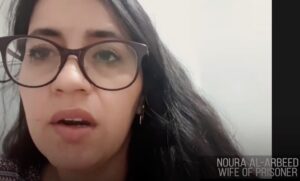
NOURA AL-ARBEED
Wife of Detained Palestinian
“When Samer was arrested, I was dropping him off at his workplace in Ramallah, when suddenly an armed group of undercover Israeli Defense Forces (IDF) member attacked us, and started beating and frisking him.”
“When Samer was arrested, he was taken to Ofer prison, where special rooms were prepared for military interrogation. And the interrogators were taking turns in torturing him. From what we know, two hours after his arrest, Samer was in al Moskabiyya interrogation centre. After 2 days the Shabak (Israeli security agency) announced that Samer and a group of men are linked to a military cell that killed an Israeli girl, and accused Samer of being the leader of the cell, and that he is in critical condition in Hadassah Hospital.”
“We immediately went to the hospital, which was full of police and intelligence members who stopped us from getting to the ICU room where Samer was, as they knew we were his family. They made sure that we ddid not get any information about his medical condition at all. We kept waiting, the allowed the lawyer to see him for only 2 minutes. The lawyer saw him, same was in a very critical condition.
His ribs were broken, his heart stopped, he suffered from muscle atrophy that led to kidney failure. He had 11 broken ribs from his ribcage, and he was unconscious and in a coma.”
“Samer was in the hospital for two months for treatment, then he was transferred to Al-Ramleh prison, but it is nothing like a hospital except for the few nurses working there.”
“Later they allowed me to see him at Al-Ramleh prison for a few minutes. I was shocked when I saw him. My husband was 65 kg and became 45 kg. He was gaunt, in a wheelchair, and on a respirator. He could not speak because of his broken ribs. His feet were black with gangrene. His hair was long and thick, and his beard was bushy. I felt like he was another man, not my husband who I know.”
“When Samer was at At-ramleh prison, they were supposed to give him physiotherapy treatment for his feet because of all the torture and beating he endured. They didn’t give him any treatment, he was in Al-Ramleh hospital, but he wasn’t offered any medical treatment. Even food wise, he was very thin and the doctors advised to increase the quantity of his daily meals. The food was non-nutritious, and served in small portions.”
“We were denied visits for the past three months, because of the coronavirus. They once denied him visits because he did the victory sign in court, so they denied him visits for one month.”
“Samer is currently in Nafha Prison. He’s to getting any medical attention there, even though he still has hearing problems, and his feet and chest are still in bad condition due to the torture he endured. It was a murder attempt. They tried to kill him. About two weeks after he entered a coma state, a police member opened a tear gas canister in the room, they claim that it was an accident. But how can a tear gas canister accidentally open inside a hospital room?”
“I will not give up on the torture file, I will seek all the international concerned authorities, until I get justice for my husband.”

DR. RACHEL STROUMSA
Director of the Public Committee Against Torture in Israel
“What is very common is hearing people complain that during their interrogation, they’re subjected to different kinds of abuse, including nonphysical-torture. And by non-physical torture we include sleep deprivation, which is extraordinarily physical in its effects on the body. When I say non-physical methods, I am also including in this the use of threats. People are threatened, ‘You will come out of this interrogation room in a wheelchair, you will come out of this paraplegic,’ or ‘We will arrest you mother.’”
“When detainee is tied up for varying lengths of time, that place a great deal of tension on the nerves and on the muscles. So for instance someone is tied with their hands behind their back, that sounds minor but over a sustained period of time that creates very real damage. Israel dose not have a law in the criminal code criminalizing torture, which is an embarrassment. But, Israel has been a signatory of the convention against torture since the 1980’s, and the convention against torture of course, describes the absolute prohibition against torture and ill-treatment. Israel has accepted that, unfortunately there is still a loophole in the Israeli legal system, and that loophole is what’s known as, the so-called, ‘necessity defense’ which is sometimes referred to as, ’ticking time bomb scenario’ of which Samer Arbeed is part of. These are interrogations that absolutely include very obvious physical violence and abuse against the detainee. “
“Samer Arbeid is really at the extreme end, but it is important for me to emphasize that in other ways his case is not unusual, it is part of a spectrum.”
“This is a situation where the health professionals, are not following the very clear, ethical health guidelines. Because they see themselves as part of the prison administration.”
“For the past 19 years, both the Public Committee Against Torture in Israel (PCATI) and other organizations, and other lawyers have filed over 1300 complaints, not a single one of those complaints has led to charges being filed. Whether Samer Arbeed’s complaint will be the first one to lead to such charges, I don’t know. But somebody one day will be the first person who will have his say in the court.”
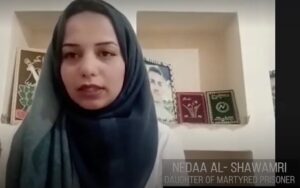
NEDAA AL-SHAWAMRI
Daughter of Deceased Prisoner
“My father was taken to prison in 1995, he spent 20 years in prison. In the beginning of 2013, he began suffering from pain in one of his molars. So he headed to the clinic Al-Ramleh prison, to receive treatment. They injected him with an anesthetic, they claim that its an anesthetic injection. The effect of this injection steady for 3 days, its side-effects included swelling of the head and body. After a period of time, his ability to speak weakened. It’s worth noting that we weren’t allowed to visit him. When we went to visit him after two months, to our surprise, we noticed these side effects on him. We could see that his face was swollen, and that he was sick.”
“The clinic in Al-Ramleh prison refused to give him any medication except for Acamol. I would like to note that this Acamol tablet is given to all the prisoners, regardless of what the illness is.”
“We camped in protest for seven months. Seven months and the prison authorities were medically neglecting my father. They refused him any medical attention, or any visit from an external doctor, to treat my father.”
“After a great deal of suffering, and calls for help, my father was released from Israeli prison, unable to walk. Barely able to move. His ability to speak was poor. He would have to say the word multiple times just for you to understand what he is saying. When he first left prison, he went to Al-Ahli hospital in Hebron. He went to Jordan for treatment, yet there was no success. He went to Germany also for treatment, and sadly, there was no success there either.”
“A few months later, he was completely unable to move, he was only able to move his eyes. He was like a dead body on the bed. Until he passed away in 2016. I would like to note here, that my father had no pre-existing conditions, he had an athletic body, his health was better than ours, despite him being in prison. He had a black belt. So it doesn’t make sense how he can get this sickness.”

